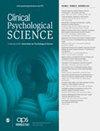Linking Executive Control and Emotional Response: A Training Procedure to Reduce Rumination
IF 4.8
2区 医学
Q1 PSYCHIATRY
引用次数: 121
Abstract
Rumination, a maladaptive self-reflection, is a risk factor for depression, thought to be maintained by executive control deficits that impair ruminators’ ability to ignore emotional information. The current research examined whether training individuals to exert executive control when exposed to negative stimuli can ease rumination. A total of 85 participants were randomly assigned to one of two training conditions. In the experimental condition activation of executive control was followed predominantly by the presentation of negative pictures, whereas in the control condition it was followed predominantly by neutral pictures. As predicted, participants in the experimental group showed reduced state rumination compared with those in the control group. Furthermore, trait rumination, and particularly its maladaptive subtype brooding, was associated with increased sadness only among participants in the control group, and not in the experimental group. We argue that training individuals to exert executive control when processing negative stimuli can alleviate ruminative thinking and rumination-related sad mood.连结执行控制与情绪反应:减少反刍的训练程序
反刍是一种不适应的自我反思,是抑郁症的一个风险因素,被认为是由执行控制缺陷维持的,这种缺陷损害了反刍者忽视情绪信息的能力。目前的研究考察了训练个体在暴露于负面刺激时施加执行控制是否可以缓解反刍。共有85名参与者被随机分配到两种训练条件中的一种。在实验条件下,执行控制的激活主要是负面图片的呈现,而在控制条件下,执行控制的激活主要是中性图片的呈现。正如预测的那样,与对照组相比,实验组的参与者表现出更少的状态反刍。此外,反刍特质,尤其是它的不适应亚型沉思,只在对照组的参与者中与悲伤增加有关,而在实验组中则没有。我们认为,训练个体在处理负面刺激时施加执行控制可以缓解反刍思维和反刍相关的悲伤情绪。
本文章由计算机程序翻译,如有差异,请以英文原文为准。
求助全文
约1分钟内获得全文
求助全文
来源期刊

Clinical Psychological Science
Psychology-Clinical Psychology
CiteScore
9.70
自引率
2.10%
发文量
35
期刊介绍:
The Association for Psychological Science’s journal, Clinical Psychological Science, emerges from this confluence to provide readers with the best, most innovative research in clinical psychological science, giving researchers of all stripes a home for their work and a place in which to communicate with a broad audience of both clinical and other scientists.
 求助内容:
求助内容: 应助结果提醒方式:
应助结果提醒方式:


